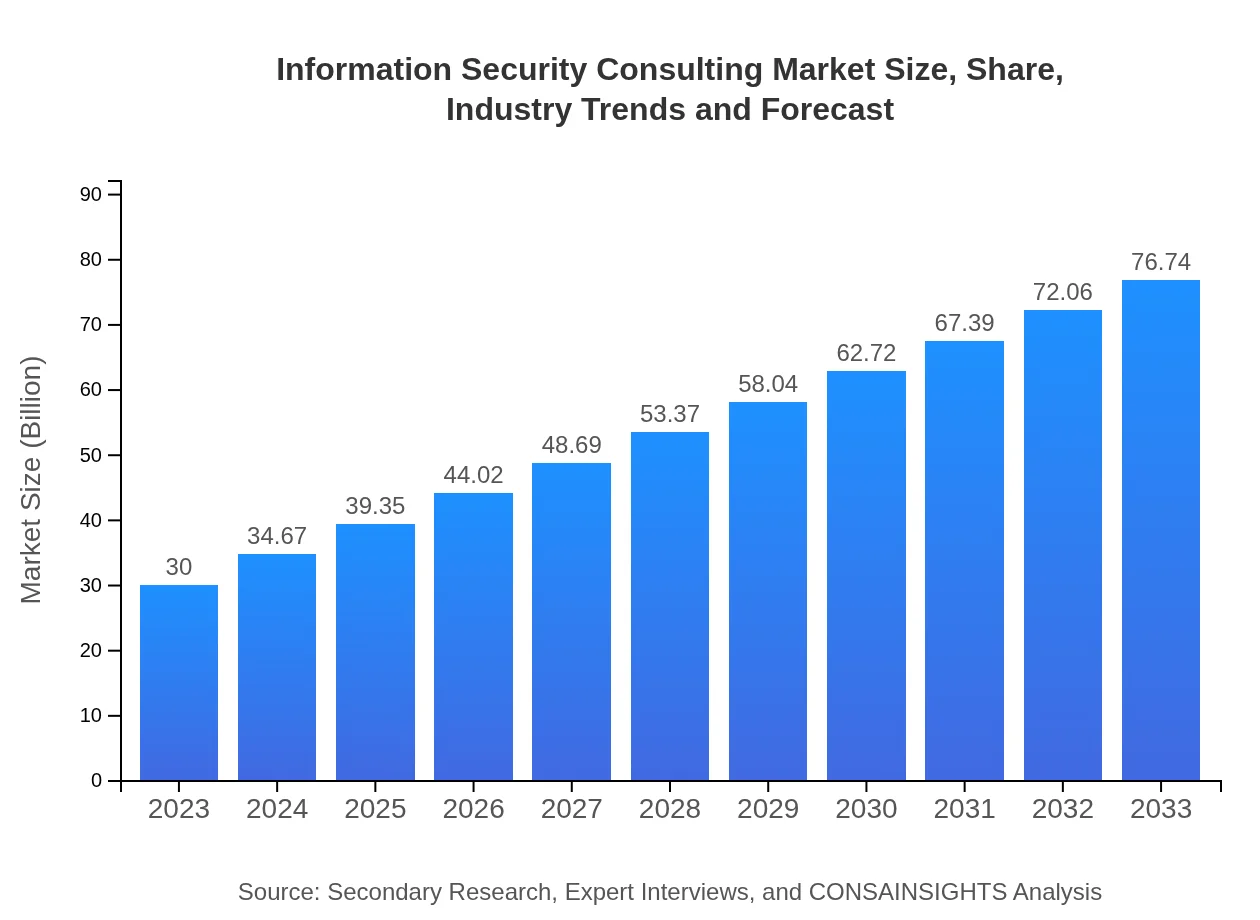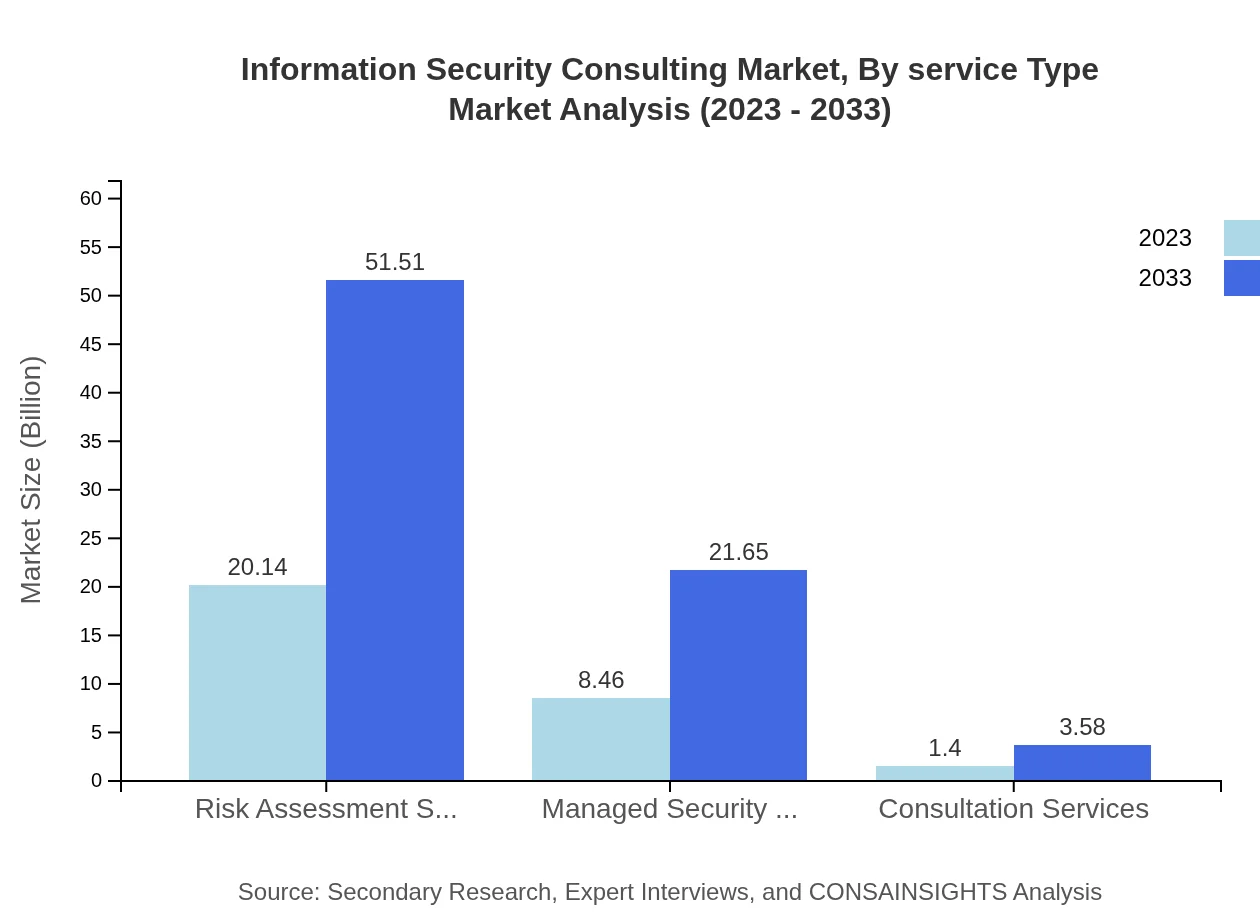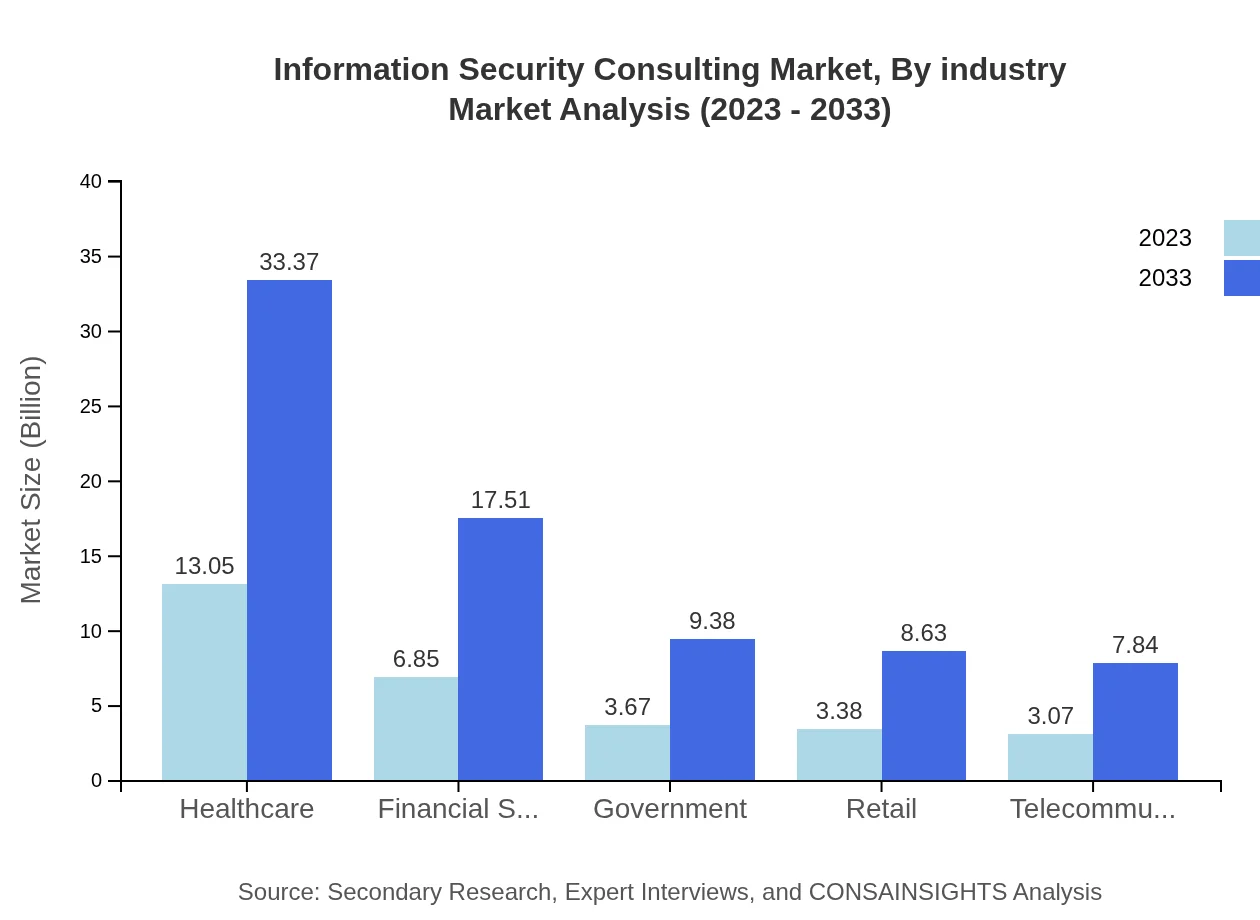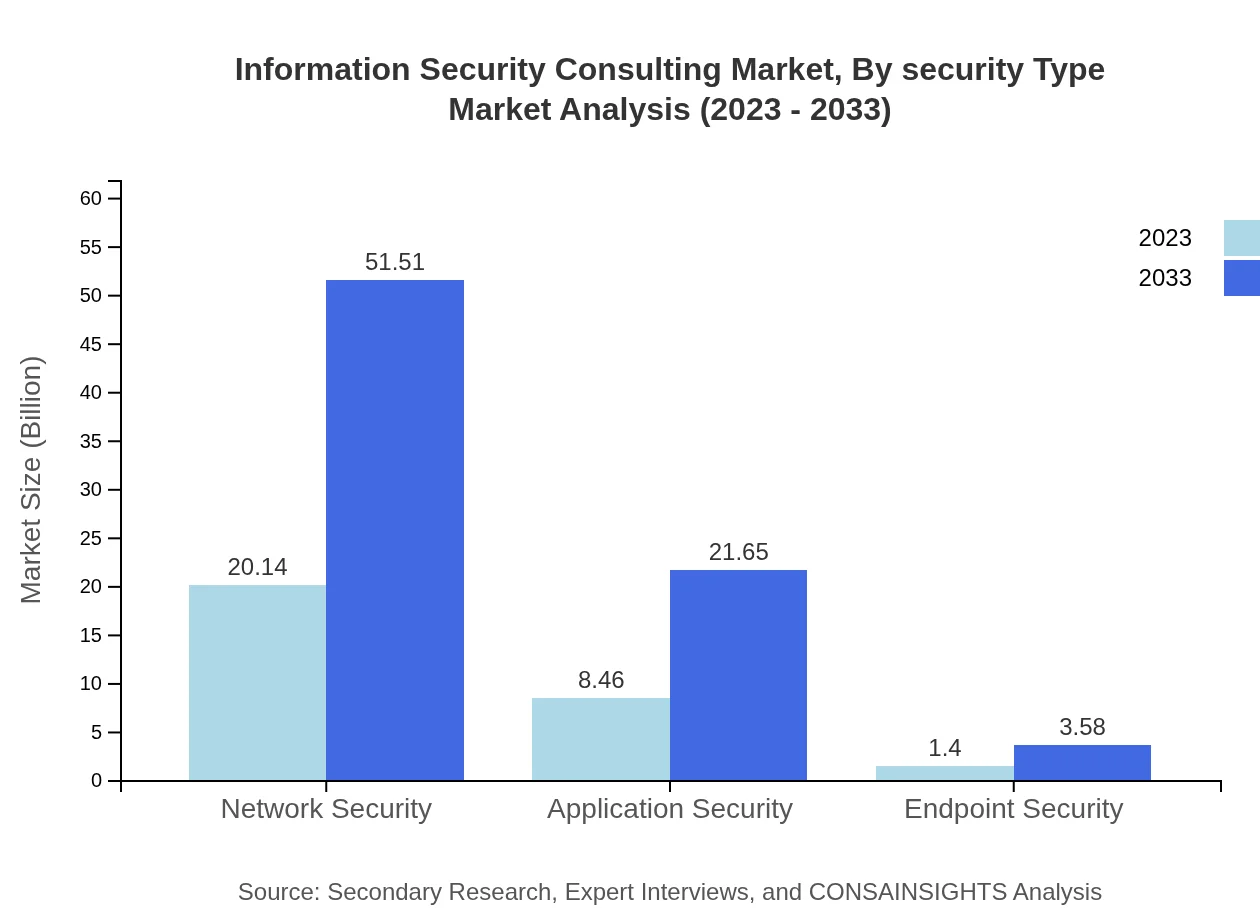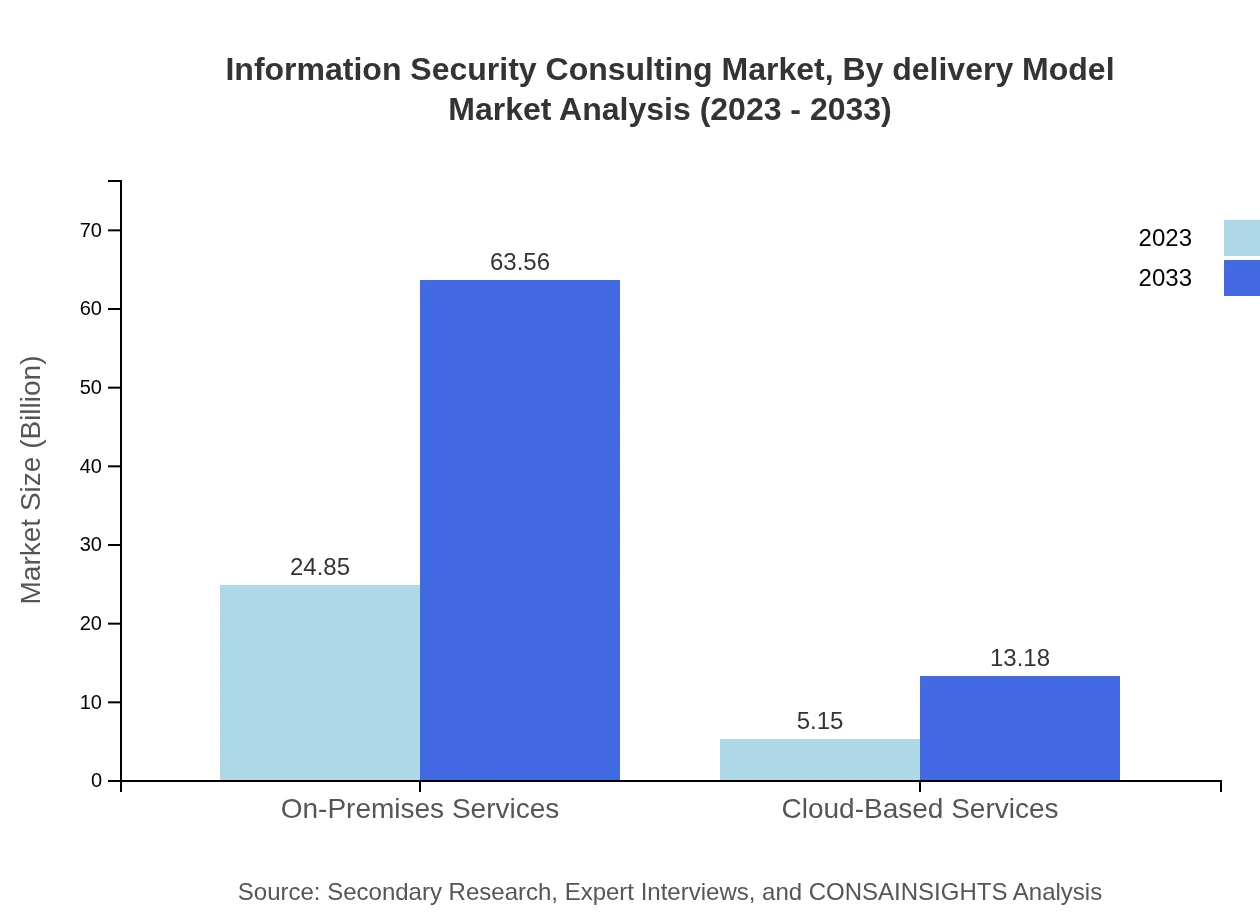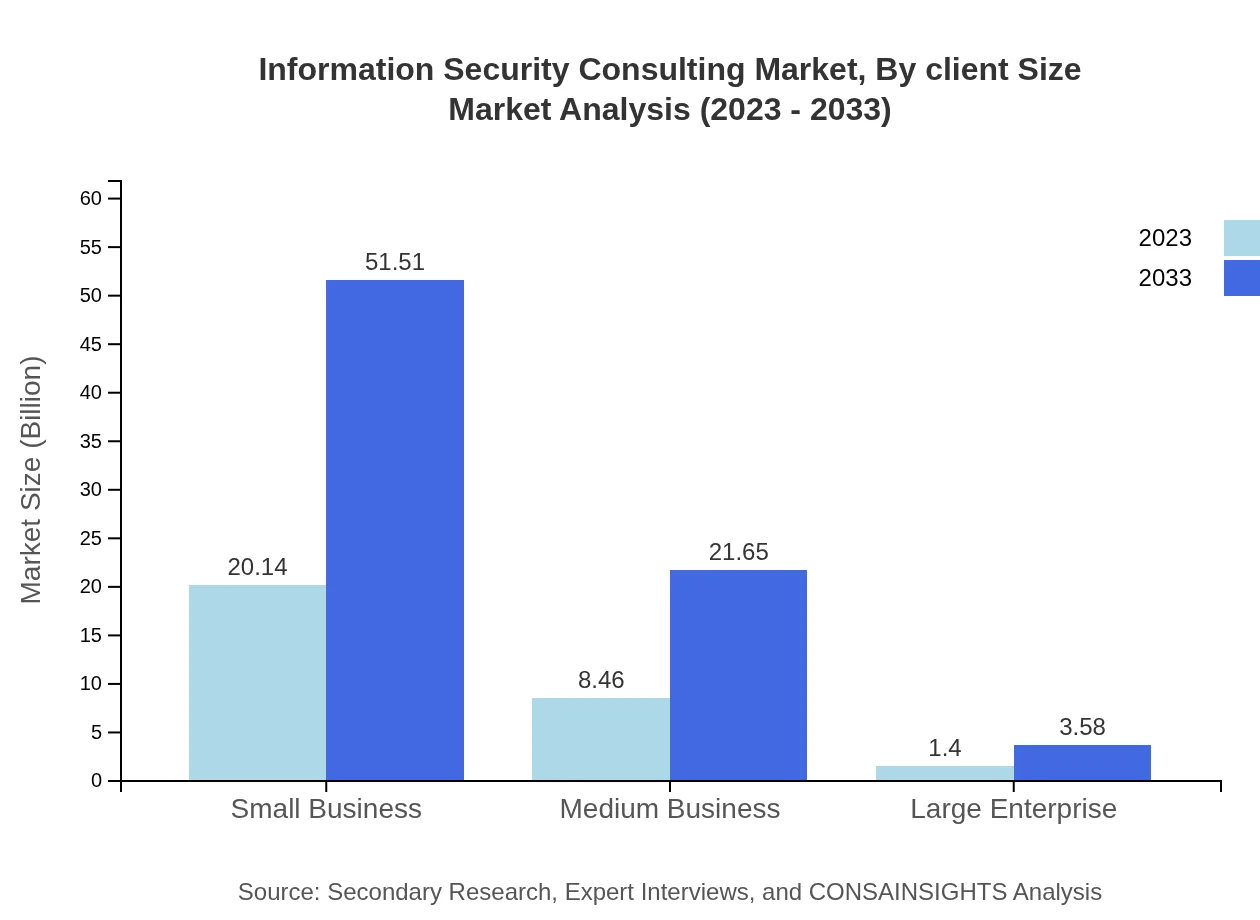Information Security Consulting Market Report
Published Date: 31 January 2026 | Report Code: information-security-consulting
Information Security Consulting Market Size, Share, Industry Trends and Forecast to 2033
This report provides a comprehensive analysis of the Information Security Consulting market, examining trends, growth projections, and strategic insights from 2023 to 2033. Key sections include market size, regional analyses, and competitive landscape, offering valuable data for stakeholders to strategize effectively.
| Metric | Value |
|---|---|
| Study Period | 2023 - 2033 |
| 2023 Market Size | $30.00 Billion |
| CAGR (2023-2033) | 9.5% |
| 2033 Market Size | $76.74 Billion |
| Top Companies | Accenture, Deloitte, PwC, KPMG, IBM Security |
| Last Modified Date | 31 January 2026 |
Information Security Consulting Market Overview
Customize Information Security Consulting Market Report market research report
- ✔ Get in-depth analysis of Information Security Consulting market size, growth, and forecasts.
- ✔ Understand Information Security Consulting's regional dynamics and industry-specific trends.
- ✔ Identify potential applications, end-user demand, and growth segments in Information Security Consulting
What is the Market Size & CAGR of Information Security Consulting market in 2023?
Information Security Consulting Industry Analysis
Information Security Consulting Market Segmentation and Scope
Tell us your focus area and get a customized research report.
Information Security Consulting Market Analysis Report by Region
Europe Information Security Consulting Market Report:
Europe's market is predicted to grow from $7.44 billion in 2023 to $19.02 billion by 2033, with robust government initiatives to tighten cyber regulations and industry leaders increasingly investing in security measures to safeguard customer data.Asia Pacific Information Security Consulting Market Report:
The Asia-Pacific region is experiencing rapid growth in the Information Security Consulting market, expected to rise from $5.94 billion in 2023 to $15.20 billion by 2033. The surge is fueled by digital transformation initiatives and increasing investments in cybersecurity from both government and private sectors, particularly in countries like China, India, and Japan.North America Information Security Consulting Market Report:
North America remains the largest market for Information Security Consulting, valued at $9.94 billion in 2023 and forecasted to reach $25.43 billion by 2033. The region's maturity in technology adoption and stringent cybersecurity regulations drive demand for consulting services.South America Information Security Consulting Market Report:
In South America, the market is projected to grow from $2.72 billion in 2023 to $6.95 billion by 2033. Growing internet penetration and increasing cyber threats compel organizations to adopt rigorous cybersecurity measures, creating opportunities for security consulting services.Middle East & Africa Information Security Consulting Market Report:
The Middle East and Africa show a market growth from $3.96 billion in 2023 to $10.13 billion by 2033. Growing cyber threats, particularly in countries undergoing digital transformation, have significantly increased the dependency on security consulting services.Tell us your focus area and get a customized research report.
Information Security Consulting Market Analysis By Service Type
The service type segmentation reveals that risk assessment services are the market leaders, expanding from $20.14 billion in 2023 to $51.51 billion by 2033, holding significant market share through their essential preventive roles. Managed security services are also crucial, expected to grow from $8.46 billion to $21.65 billion over the same period. Other service types include consultation services, network security, and application security, with each fulfilling specific security needs across various enterprise sizes.
Information Security Consulting Market Analysis By Industry
The industry segmentation focuses on several industries, particularly healthcare, financial services, and government sectors. The healthcare industry is projected to escalate from $13.05 billion in 2023 to $33.37 billion by 2033, making up a substantial market share of 43.49%. Financial services will also see considerable growth from $6.85 billion to $17.51 billion, while government and retail sectors will grow steadily, emphasizing the critical need for robust information security.
Information Security Consulting Market Analysis By Security Type
Segmentation by security type highlights a growing emphasis on network and endpoint security, with network security projected to rise from $20.14 billion to $51.51 billion. Application security also sees an encouraging growth trajectory, expected to span from $8.46 billion to $21.65 billion, as companies prioritize protecting sensitive applications from sourcing through to deployment.
Information Security Consulting Market Analysis By Delivery Model
The delivery model analysis delineates between on-premises and cloud-based services, where on-premises services are forecasted to grow significantly from $24.85 billion in 2023 to $63.56 billion by 2033. Cloud-based services will also gain traction, growing from $5.15 billion to $13.18 billion as businesses focus on flexibility and operational efficiency.
Information Security Consulting Market Analysis By Client Size
Market analysis by client size reveals small businesses leading the market with a share of 67.12%, projected to expand from $20.14 billion to $51.51 billion. Meanwhile, medium businesses and large enterprises are also increasing their security consulting services due to heightened awareness of cyber threats and emerge with their respective growths in market share and size.
Information Security Consulting Market Trends and Future Forecast
Tell us your focus area and get a customized research report.
Global Market Leaders and Top Companies in Information Security Consulting Industry
Accenture:
Accenture is a leading global professional services company that offers a comprehensive range of consulting services across various sectors, including information security consulting, leveraging advanced technologies to enhance security frameworks.Deloitte:
Deloitte provides audit, consulting, and risk advisory services globally, with a strong emphasis on cybersecurity solutions aimed at helping clients understand and mitigate evolving risks.PwC:
PricewaterhouseCoopers specializes in offering industry-focused services, including security consultation, to assist organizations in managing their risks while enhancing their information security posture.KPMG:
KPMG is a global network of professional services firms providing audit, tax, and advisory services, including customized information security consulting aimed at addressing specific organizational needs.IBM Security:
IBM Security delivers advanced threat intelligence and security services, helping organizations enhance their security and compliance through tailored consulting solutions.We're grateful to work with incredible clients.









FAQs
What is the market size of information Security Consulting?
The information security consulting market is currently valued at $30 billion, with a remarkable compound annual growth rate (CAGR) of 9.5%. This growth highlights the increasing demand for security solutions amidst rising cyber threats.
What are the key market players or companies in the information Security Consulting industry?
Key players in the information security consulting industry include Accenture, Deloitte, IBM, PwC, and KPMG. These companies play a significant role in shaping market strategies, enhancing security protocols, and pushing innovation in the sector.
What are the primary factors driving the growth in the information security consulting industry?
Factors driving growth include increasing cyber threats, regulatory compliance requirements, and the rise of cloud services. Additionally, organizations are prioritizing risk management, which is leading to increased investment in information security consulting.
Which region is the fastest Growing in the information security consulting market?
North America is currently the fastest-growing region in the information security consulting market, expected to grow from $9.94 billion in 2023 to $25.43 billion by 2033, driven by heightened cybersecurity awareness and demand.
Does ConsaInsights provide customized market report data for the information security consulting industry?
Yes, ConsaInsights offers customized market report data tailored to the information security consulting industry, allowing clients to gain specific insights that meet their unique business needs and strategic goals.
What deliverables can I expect from this information security consulting market research project?
Expect comprehensive market analysis, trend reports, competitor insights, and actionable recommendations tailored specifically to the information security consulting sector's dynamics and growth opportunities.
What are the market trends of information security consulting?
Market trends include the increasing adoption of managed security services and a shift towards cloud-based security solutions. Organizations are also focusing on integrating AI and machine learning for enhanced security measures.

